
- Film
Spartacus (1960): Kubrick’s Golden Globe-Winning Historical Epic
One of the most intelligent and exciting historical epics to have come out of Hollywood, Spartacus, inspired by the true story of the slave rebellion and the third servile war in ancient Rome, features Kirk Douglas in one of his most iconic parts. Well cast, Douglas brings his customary muscular physicality and emotional intensity to the titular role.
After David Lean turned down the offer to direct, Douglas, who initiated the project and served as producer, hired Anthony Mann, then best known for his Jimmy Stewart’s Westerns Winchester ’73 and The Naked Spur. However, Douglas fired Mann after one week of shooting, in which the opening sequence in the quarry had been shot. ‘He seemed scared of the scope of the picture,’ Douglas later wrote in his memoir, making a rather dubious statement as one year later Mann would be making the epic El Cid.
Though Douglas did not particularly enjoy his collaboration with Kubrick on the set of the 1957 Paths of Glory, a superb WWI movie, he nonetheless recognized the director’s talents and hired him as a replacement to Mann. Kubrick seldom talked about Spartacus, an impressive enterprise in many departments, perhaps because of the on-set conflicts with Douglas and the fact that it was the only picture over which he did not exercise complete artistic control (Douglas had final cut).
Contrary to popular notion, however, Kubrick didn’t disown the movie completely – he just claimed that it did not reflect his vision. The ending, in which Spartacus becomes a martyr and his family and newborn son escape to freedom, was imposed by Douglas against his wishes.
The driving force behind this massive project, Douglas’ company, Bryna, raised the large budget of $12 million, allocating the production no less than 167 days of principal photography. But the cost and efforts paid off, for the movie became one of the year’s top-grossing movies. Later on, Spartacus became popular among younger viewers who saw it in revival houses and on TV, and in several theatrical re-releases in the late 1960s and 1970s.
Spartacus received six Golden Globe nominations, winning one, Best Picture-Drama. Laurence Olivier garnered a Best Actor nod, though it was Burt Lancaster who was declared winner, for Elmer Gantry. Kubrick, who would become a perennial Globe nominee (ultimately scoring four Globe nominations but winning none), lost that year to British director Jack Cardiff, honored for Sons and Lovers.
The sharply observant script was written by Dalton Trumbo after a long period of blacklisting – he was one of the Hollywood Ten and had been ghostwriting until Douglas controversially returned him to credits in this film – based on the 1951 novel by Howard Fast, who was also known for his communist tendencies. As a result, Spartacus propagates democratic values that were in tune with the new zeitgeist. Spartacus was released on October 6, four weeks before the election of the young, energetic, and liberal John F. Kennedy as the 35th President of the United States.
Set around 73 BC, the saga is not entirely faithful to the known historical facts. For starters, the real Spartacus was killed in battle and was not crucified, as depicted in the movie.
When the tale begins, Spartacus (Douglas), a rebellious, strong-willed Thracian slave, is purchased by Lentulus Batiatus (Peter Ustinov), the proprietor of a gladiator school. Like his fellow trainees, Spartacus is instructed in various fighting skills, to be profitably showcased in the games of the Roman Coliseum.
Spartacus leads a revolt, organizing a band of 78 slaves who escape from the gladiator school at Capua, 130 miles south of Rome. Their professed goal is to liberate the oppressed and subjugated men from the tyrannical rule of the patricians, led by Marcus Crassus (Laurence Olivier).
The film is populated with interesting characters, played by some of Hollywood’s top talent. Charles Laughton plays Gracchus, the senator who engages in a political power struggle with Crassus. Jean Simmons is Varinia, the beautiful slave and wife of Spartacus whom Crassus had previously arranged to purchase as his property. John Gavin is the young Julius Caesar, a student of Gracchus who later allies himself with Crassus.
More visually restrained, and less eccentric, than Kubrick’s other films, Spartacus was shot by the distinguished photographer Russell Metty (better known for teaming with Douglas Sirk on the stylish melodramas Written on the Wind and Imitation of Life). It also demonstrates Kubrick’s characteristic attention to detail, including the gladiators’ thorough training and graphic violence involved in their fights.
The climax, the preparation for the massive final battle in which the Romans attack the rebels’ army, is particularly impressive. Shot in Spain, Spartacus was made in an age still devoid of special effects, with the brutally bloody fight physically staged by 8,000 soldiers (largely played by local Spaniards).
Remarkably, Spartacus steers clear of the genre’s staples and clichés, such as chariot races, seen to an advantage in Ben-Hur, made by William Wyler the year before, or food orgies and belly dancing, which appear in most of Hollywood’s historical spectacles.
Having been severely cut for a 1967 theatrical re-release, the current version of Spartacus benefits from a massive 1991 restoration, which reinserted footage that was shot but was considered too risqué in 1960. This includes a rather explicit seduction scene between Olivier’s elderly and corrupt Crassus and his handsome slave Antoninus, played by Tony Curtis. Since the soundtrack of that sequence had been lost, and Olivier was no longer alive, Anthony Hopkins, a master of mimicry, redubbed quite effectively Olivier’s original dialogue.